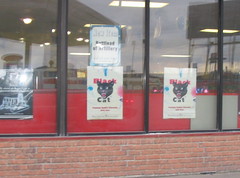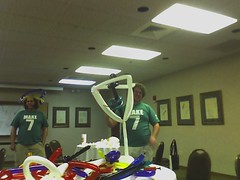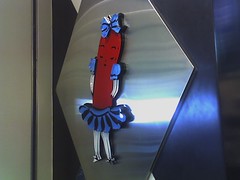Recently I and a person of the younger set (let's call him "N") were talking about Steriogram, his favorite band. Steriogram is best known for their Michael Gondry directed music video for their song "Walkie Talkie Man". N named a few more songs that he enjoyed and mentioned that Steriogram did a cover of AC/DC's Back in Black that was, in his words: "better than the original".
I said (paraphrased), "That's an interesting opinion, and I respect your opinion, but if you're presenting that statement as fact, then you're just wrong".
He said (paraphrased), "Nuh-huh".
To which I responded (again paraphrased), "Yuh-huh".
And we went back and forth in this manner for a while. My thesis was this: AC/DC's Back in Black can be scientifically determined to rock harder than Steriogram's version. I realize that one's opinion that one song is better than another cannot be argued with. Matters of opinion, like matters of faith, sneak out the back window when logic starts knocking on the door. That's fine. I can cherish one's opinion, even as I disagree. But it can be proven that AC/DC rocks out harder.
For those about to rock:
To begin with, let's examine the context the each song resides in. Australia's AC/DC released "Back in Black" as the title cut from their third album in 1980 as an unspoken tribute to Bon Scott, the lead singer of the band who had recently passed away. The C of D was listed "Death by Misadventure". Brian Johnson was selected as the band's new lead singer and because of his voice, Angus Young's lead guitar, Malcomb Young's rhythm guitar, Cliff Williams's bass guitar and Phil Rudd's Drums the album became a cultural touchstone for the 1980's and the fifth bestselling album of all time in the United States (selling over 21 million copies). The album has sold 40 million copies worldwide, making it second only to Michael Jackson's Thriller. Adam Williams of PopMatters.com states, "The importance of Back in Black to ... the overall musical landscape of 1980 cannot be overstated." Indeed, harder rock and metal music was a marginalized genre prior to 1980 and mainstream radio appeal of this style of music was unheard of before Back in Black. The song is listed as song #187 on Rolling Stone's 500 Best Songs of All Time list. Rolling Stone also called the album "the essence of unrepentantly simple but savagely crafted hard rock." Google lists over 70 thousand people listing this album as one of their desert island discs (including Martin Tielli of the Rheostatics).
Steriogram hails from New Zealand and is best described as a new metal or street punk/rap band. The bands lineup consists of Tyson Kennedy (rap vocals and sounds), Tim Youngson (guitar), Brad Carter (vocals and guitars), Jared Wrennall (drums and vocals), Jake Adams (bass guitar). According to Wikipedia, in April and May 2002 they did a tour throughout New Zealand playing free shows at school during lunchtime which began their grassroots support. Their song "Walkie Talkie Man" was featured in advertisments for Apple's iPod. They have a MySpace.com page (warning: loud sound). Wikipedia also says regarding their most recent tour: "Unfortunately their live set was not the fullest, and often they had to repeat songs." Their cover of Back in Black can be found on 2004's Walkie Talkie Man EP.
And now let's rock
Some might argue that determining what song rocks more is a subjective experience, something each listener must determine by oneself. This is simply not true. If we peel back some of the layers of music we can get down to some hard data we can compare. First off is tempo, measured in beats per minute (or BPM). AC/DC's original clocks in at a somewhat leisurely 90 BPM. This tempo is actually fairly typical for a waltz and for good reason: it's the rhythm of the human heart at rest, the pace that many of us walk at and a natural tempo of certain other essential human activites outside the the scope of this article (but well within the scope of rock music). Steriogram turns up the tempo to 97 beats per minute. Music over 90 BPM produces an adrenaline response in humans. However, this physiological response should not be confused with true "rocking out" any more than one metronome can be said to rock harder than another. This increased tempo gives a pop-y, false sense of rock, associated solely with an increased heart rate, rather than the natural rate of rock that AC/DC delivers.
Second of all, let's look at song length. In-A-Gadda-Da-Vida is 17 minutes long. Bohemian Rhapsody is almost six minutes long. The point is, it takes time to rock. AC/DC's version clocks in at an ample four minutes and fifteen seconds while Steriogram's version is a mere two minutes and thirty nine seconds. AC/DC's length is squarely within the range of nearly any rock song you will hear while Steriogram seems to have recorded a shorter, top-forty radio friendly pop song.
Thirdly, it is difficult to compare AC/DC's version to any song, as it is the quintessential archetype of all that defines rock in the minds of an entire generation. According to Steven Tyler (upon inducting AC/DC into the Rock and Roll Hall of Fame): "AC/DC became the litmus test of what rock does". Against this measure, any song falls short. Steriogram's version, while obviously a competent cover, plays to a different audience then rockers. The vocal stylings draw from their street punk roots while the short rap verse towards the end of the song points to a hip-hop background. The higher tempo and shorter length, as described above, are hallmarks of pop music. Not rock. Part of the reason the Steriogram version an adequate cover is that the song is so easy to play. From Amazon:
Angus and Malcolm Young have created a lot of the catchiest guitar phrases in the entire body of rock music. Their masterpiece is the collection of gut-wrenching licks on the title song here. These will achieve timelessness because the average guitar player can learn to reproduce them--but never with the Angus touch. -Edvard Odessia
It Makes Good, Good Sense
In the final analysis, is the measure of rocking truely subjective? Yes and no. While everyone must decide for themselves what they favor, AC/DC's Back in Black has been decided to be a touchstone for all that rocks. I would imagine that part of the reason that so many copies of this album have been sold is because cassette tapes are so easily destroyed on a dash of a black, sunlight-heated Trans Am. Certainly, 40 million fans could be wrong, but there's something to be said for the wisdom of crowds. At the very least the definition of rock is culturally chosen by the listening audience around the world, and AC/DC's version rocks! Under any criteria beside personal preference the original is the superior version.
Case closed, but judge for yourself.
Fair Use MP3 samples




















